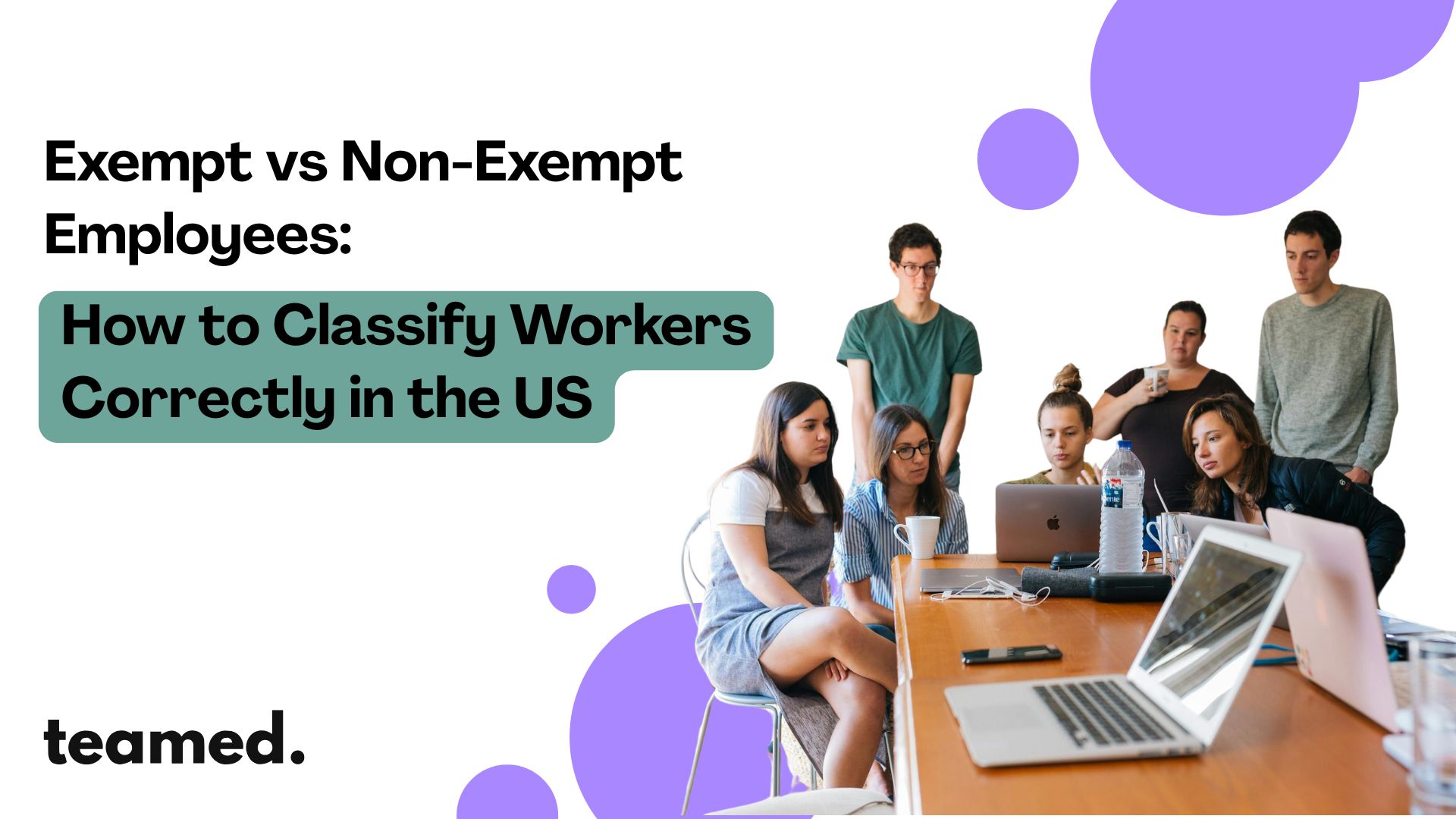Key Takeaways
- Exempt vs. non-exempt comes down to overtime. Under the FLSA, non-exempt employees are generally entitled to overtime pay at one and one-half times their regular rate for hours worked over 40 in a workweek, but some exceptions and state-specific rules may apply. Exempt employees (executive, administrative, professional, etc.) don’t.
- Job titles don’t decide exemption but duties do. A “manager” who doesn’t manage people is non-exempt, even if the title suggests otherwise.
- Misclassification is costly. Expect back pay, double penalties, government fines up to $10,000 per violation, lawsuits, and tax issues if you get it wrong.
- State laws can be stricter than federal. California, New York, and others add extra salary thresholds and duties tests. Always apply the stricter rule.
- Global employers face unique traps. U.S. exemptions rarely map neatly from other countries - pay structures, titles, and duties must all be reassessed.
- Regular reviews prevent errors. Compare actual daily duties against FLSA rules, check salary thresholds, and document decisions as jobs evolve.
- Fix fast if you find mistakes. Reclassify, update payroll, pay owed overtime, and consider voluntary compliance to reduce risk.
- Get expert help if needed. Employment law in the U.S. is complex and state-specific. No service provider can guarantee full compliance or a stress-free experience due to the complexity and variability of employment law.
Introduction
Consider this scenario where you just hired a marketing manager and you're paying this person $40,000 a year and treating them as exempt from overtime. Now, three months have passed. Then you get a call from the Department of Labor. They want to investigate. But why? And what's the result of this investigation? Well, unfortunately, you owe thousands in back pay, penalties, and legal costs. This may sound like quite a big deal, but it happens to businesses quite often these days.
Getting employee classification wrong is expensive. Really expensive! With new federal rules and different state laws, you can't afford to guess anymore. To be specific, one mistake can cost your company serious money and time.
That's why understanding the difference between exempt and non-exempt status is crucial. This guide will teach you how to classify your workers correctly. And if you need an expert partner to ensure it's done right, that's what we do at Teamed.Global . Now, let's get into the details.
Understanding the Difference Between Exempt and Non-Exempt Employees?
To be precise, the main difference is overtime pay.
Non-exempt employees get extra pay when they work more than 40 hours in a week. You pay them time and a half for those extra hours. Exempt employees don't get overtime pay. As salaried employees, their focus is on completing their job duties, not on a set number of hours.
This rule comes from the Fair Labor Standards Act (FLSA). Non-exempt workers get minimum wage protection and overtime pay. Exempt workers don't get these protections because they usually have higher-level jobs with more responsibility.
You'll see other differences too. Non-exempt employees often track their hours carefully. They might use time clocks or fill out timesheets. Many get paid by the hour. Exempt employees usually get a fixed salary. They have more flexible schedules but need to get their work done regardless of time.
Many employers want exempt employees because the costs are predictable. But you can't just decide someone is exempt because it's easier for you. The FLSA has strict rules about who qualifies.
How Does the Duties Test Work for Exempt Employees?
The duties test is the key to exempt status. Your employee must do specific types of work that fit into exempt categories. The main ones are executive, administrative, and professional jobs, as explained by the Department of Labor (fact sheet 17A) .
- Executive exempt employees manage other people. That's their main job. They need to supervise at least two full-time employees regularly. They also need authority to hire, fire, or make recommendations about other workers' jobs.
- Administrative exempt employees do office work related to running the business or making management decisions. Their work must involve using their own judgment on important matters. They can't just follow a manual or script.
- Professional exempt employees can be divided into two types. Learned professionals usually need additional knowledge in specific areas just like doctors, lawyers, engineers, or accountants. On the other hand, creative professionals work in artistic fields where creativity matters most. This includes musicians, writers, or designers.
Computer workers have their own category. They must work as systems analysts, programmers, or software engineers. Their job must involve designing or analysing computer systems. Outside sales people also get exemption when they regularly work away from your office making sales.
Remember this: the duties test looks at what people actually do every day. Not their job titles. A person called "manager" who doesn't really manage people won't qualify as exempt.
Examples of Jobs That Are Usually Exempt vs. Non-Exempt
In this section, you'll read some typical roles in each group, exempt and non-exempt that'll help you understand the terms better.
Common Exempt Jobs:
- Department managers who supervise multiple employees and make hiring decisions
- Executive assistants to top executives who make important company decisions
- Sales managers who create sales strategies and lead sales teams
- HR managers who write policies and handle complex employee problems
- Marketing directors who plan campaigns and manage big budgets
Common Non-Exempt Jobs:
- Administrative assistants doing routine office work
- Customer service representatives following set procedures
- Retail workers in stores
- Cleaning and maintenance staff
- Data entry workers and general clerks
- Most hourly production workers
Jobs That Can Go Either Way:
Some jobs cause confusion. Office managers might be exempt if they make important business decisions. But they're non-exempt if they just do routine paperwork. Team leaders could be exempt if they truly manage other people. But they're non-exempt if they're just experienced workers without real authority.
Tech jobs also create problems. A senior software developer might qualify for a computer exemption. A junior developer doing basic coding might not. You need to look at what each person actually does, not just their title or skill level.
What Happens If You Misclassify an Employee?
Getting classification wrong leads to serious money problems and legal trouble. The costs pile up fast when someone discovers your mistakes.
- Back Pay and Extra Penalties
The Department of Labor can make you pay all the overtime money you should have paid. This goes back two years for regular mistakes. For wilful violations, it goes back three years. You pay the overtime you owed plus an equal amount as a penalty.
- Government Fines
Fines for willful FLSA violations can reach up to $10,000, and criminal prosecution is possible for repeat offenders, but the application and amount of fines depend on the circumstances and are subject to judicial discretion.
- Employee Lawsuits
Misclassified workers often sue as a group. These class action cases can cost hundreds of thousands or millions in settlements and lawyer fees.
- State Penalties
Many states add their own penalties on top of federal ones. Some states make you pay double or triple damages. California has especially tough rules and big penalties.
- Tax and Benefit Problems
Misclassified employees might be entitled to benefits they didn't get. This includes health insurance, retirement money, and unemployment benefits. The IRS might also penalise you for unpaid employment taxes.
Are State Rules Different from the Federal FLSA?
Yes, state laws often protect workers more than federal rules do. You must follow whichever law helps employees more. This makes compliance tricky because rules vary a lot between states.
California has the strictest rules. More details are available on the California Labor Commissioner’s DLSE overtime FAQ page .
California law generally requires exempt employees to spend more than half their time on exempt duties and to earn at least twice the state minimum wage for full-time employment, but requirements may vary by role and are subject to change.
New York has salary requirements that often beat federal minimums. The state also requires specific ratios between exempt and non-exempt duties. Pennsylvania, Illinois, and Washington have their own overtime rules that differ from federal ones.
Some states don't accept certain federal exemptions. Several states don't allow the federal computer worker exemption. Others have changed requirements for outside sales exemptions. Some states have special rules for certain industries.
This patchwork means a classification that works in one state might break another state's rules. Employers operating in multiple states must comply with each state's specific requirements, and while applying the strictest standard may reduce risk, it is not a legal requirement and may not always be practical or necessary.
How Should Global Employers Approach U.S. Employee Classification?
International companies face extra challenges when they hire American workers. U.S. rules are very different from employment laws in other countries. This creates compliance traps for global employers.
Many countries have simpler systems or stronger worker protections that make overtime exemptions unusual. Global employers often think they can use the same practices in the U.S. But American law requires careful analysis of each job against specific rules.
Job titles and duties that work for exemptions in other countries might not meet U.S. requirements. A "manager" in the UK might not qualify as exempt in the U.S. They might not supervise enough people or lack real authority over hiring and firing.
Global employers also need to think about how their pay structures work with U.S. rules. Stock options, bonuses, and other variable pay might not count toward salary requirements for exempt status. This could mean restructuring pay packages for U.S. workers.
You need experienced U.S. employment lawyers or specialised global employment services. These experts help international companies follow federal and state rules while keeping consistent global practices where possible. Teamed.Global provides the fractional HR support international businesses need to build compliant and effective U.S. employment practices.
How Can You Review and Fix Employee Misclassification Now?
Checking job classifications on a regular basis isn’t just about avoiding fines, it’s about keeping up as roles naturally change over time. Think of it as a health check for your business.
A good place to start is with job descriptions, but don’t stop at whatever’s written down years ago. Sit with employees, chat with their managers, and pay attention to what the work really looks like day to day. Who’s making decisions? How’s the time being spent? Those details matter more than outdated paperwork.
Steps for Your Classification Review:
- Write down actual job duties and time spent on each type of work
- Check that salaries meet current federal and state minimums
- Look at decision-making authority and independence levels
- Review supervisory duties and employee management responsibilities
- Check education requirements and specialised knowledge needs
- Look at customer interaction and sales duties
Create a system by sorting positions into clear exempt and non-exempt groups. Mark questionable classifications for deeper review. Think about how jobs have changed since you first classified them. Job duties often evolve without anyone formally recognising it.
When you find misclassifications, fix them quickly. Tell affected employees about the changes and update your payroll systems right away. Calculate any back pay you owe and make a plan for handling past violations. Consider voluntary compliance with the Department of Labor if violations are serious.
Keep detailed records of your classification decisions. Document how you applied the duties test and salary requirements to each position. This paperwork becomes crucial if anyone challenges your classifications later.
What Are Other U.S. Employment Classification Terms You Should Know?
Other than the U.S. Employment Classification, here are a few other classification terms you should know about.
- Employee versus independent contractor is the most basic classification decision. The IRS (Internal Revenue Service) has its own independent contractor test that looks at these factors in detail. Key factors include how much control you have over the work, whether the worker can profit or lose money, and whether the work is central to your business. Getting this wrong can trigger worse penalties than exempt/non-exempt mistakes.
- Full-time versus part-time classifications affect benefit eligibility and laws like the Affordable Care Act. No federal law defines these terms exactly, but many benefit plans and state laws use 30 hours per week as the full-time line.
- Temporary versus permanent workers have different rights under various employment laws. Temporary workers hired through staffing agencies create shared duties between the agency and your company. Permanent workers who seem temporary because of project work might still get full employee protections.
- The HCE threshold is subject to change and may be updated by regulation or court decision. The $107,432 threshold is current as of 2024, but employers should verify the latest requirements.
Teamed.Global helps companies handle all these classification complexities. We make sure your employment practices follow current federal and state requirements while supporting your business goals.
FAQs
Can you change an employee from non-exempt to exempt without a promotion?
You can reclassify employees if their actual duties and salary meet exemption requirements. But you cannot simply change classification because it's convenient.
Do exempt employees have to work a minimum number of hours?
No federal law requires exempt employees to work specific hours. But they must complete their job duties regardless of time needed. Some companies set minimum hour expectations, but these aren't legally required.
Can exempt employees get overtime pay?
Yes, you can pay exempt employees overtime even though you don't have to. Some companies do this to keep good employees or be fair. But paying overtime doesn't change their exempt classification.
What if state and federal laws disagree on classification?
Always follow the law that protects workers more. If state law requires higher salary minimums or stricter duties tests, those requirements beat federal minimums.
Final Takeaway
At the end of the day, in case of incorrect employee classification, your business might end up suffering from penalties and fines.
So, if you have a startup or your company is expanding into a new state, making sure roles are classified correctly should be one of the first things on your list. To take expert assistance on this issue, get in touch with Teamed.global .







